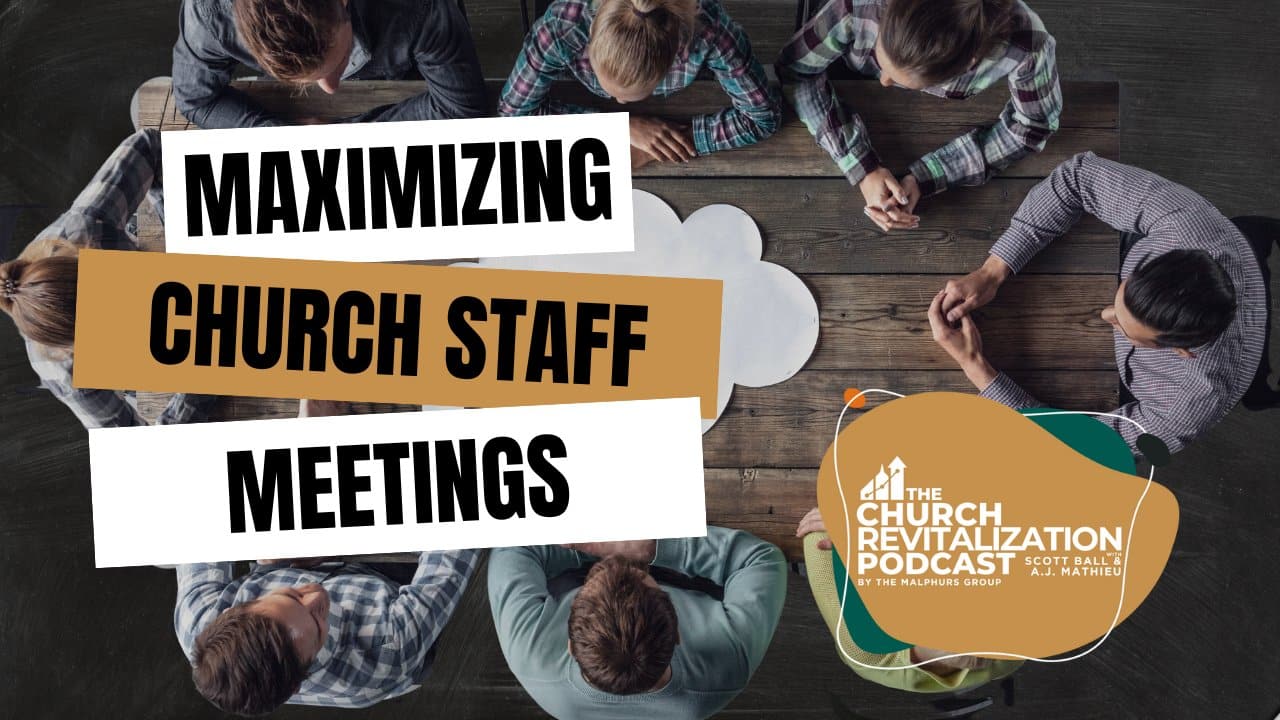The Church Revitalization Podcast – Episode 315– Effective Church Staff Meetings
If you only had one hour with your staff team every week, how would you invest it? Most churches waste their staff meeting time with idle chit chat or lengthy reports that could have been sent via email. What if your staff meetings actually drove vision and moved the ministry forward? Whether you have a large staff or just a few part time team members, maximizing your limited time together is crucial. Here are five practical ways to transform your staff meetings from obligatory gatherings into strategic sessions that advance your church’s mission.
Prepare, Don’t Wing It
One of the biggest mistakes church leaders make is walking into staff meetings without a clear plan. If your staff meetings feel repetitive or aimless, it’s time to set an agenda in advance. Before your next meeting, create a structured plan that outlines what you need to accomplish during that hour together.
Ask your team members to submit short updates ahead of time. These can be simple bullet points covering what they’ve completed and what’s coming up in their ministry areas. This prevents you from wasting valuable meeting time on basic status reports. Information gathering can happen through email or project management software, freeing up your actual meeting time for more meaningful collaboration and decision making.
Prioritize Collaboration Over Reporting
The purpose of effective church staff meetings is collaborative thinking, not information transfer. If you gather reports ahead of time, you can spend your meeting discussing what that information means and what you need to do about it. Instead of hearing numbers and updates for the first time in the meeting, you can dive straight into strategic conversations.
Focus your time on questions like these: What decisions do we need to make together? What roadblocks are we facing that require team input? How can we work across ministry areas to solve this challenge? For example, if you already know which families visited your church last Sunday, you can use meeting time to discuss creative ways to connect them with existing members or pair them with someone in their neighborhood. True collaboration requires input and brainstorming, not just passive listening to reports.
Keep the Right Conversations in the Right Spaces
Not every conversation belongs in a staff meeting. When you notice a discussion veering into details that only affect one person or one ministry area, put a pin in it and take that conversation offline. Reserve your staff meeting time for shared priorities, systems, and cross team collaboration.
This is especially important when it comes to performance issues or corrections. Using the staff meeting to call someone out in front of the entire team is a power move that damages morale and trust. If someone needs coaching or correction, handle that in a one on one meeting. Your staff meeting should be a place where everyone feels safe to collaborate, not a venue for public criticism. Keep your focus on what affects everyone in the room.
Drive Toward Vision and Strategy
Your staff needs to hear about your church’s mission and vision even more than your congregation does. While your church members need regular reminders throughout the year, your staff team needs to see how their work connects to the bigger picture every single week. Effective church staff meetings should always tie back to where God is calling your church.
Don’t let the day to day details cloud out the mission. Your team doesn’t necessarily need you to recite the mission statement at every meeting, but they do need to feel it and understand how their role fits into the larger strategy. Make space in your agenda for important conversations that aren’t urgent, like leadership development, discipleship effectiveness, or assimilation strategies. These topics won’t demand immediate attention, but they’re essential for long term health. If you only focus on what’s urgent, you’ll never make progress on what’s truly important.
End with Clarity and Accountability
Every effective staff meeting should conclude with crystal clear action items. Think of your team as constantly managing multiple projects. Even though you might not use project management language, the principles still apply. Tasks need owners, due dates, and clear deliverables.
Before your team leaves the room, make sure everyone understands what they’re responsible for in the coming week. No one should have any ambiguity about who is doing what. When you reconvene the following week, you should be able to check in on those commitments and build a culture of accountability. This simple practice of ending with clarity will prevent dropped balls, miscommunication, and the frustration of assuming someone else handled something that fell through the cracks.
Moving Forward
Running effective church staff meetings isn’t rocket science, but most churches aren’t implementing these basic principles. You can transform your meetings by gathering information ahead of time, focusing on collaboration instead of reporting, keeping one on one conversations separate, anchoring discussions in your vision, and ending with clear accountability.
Challenge yourself to audit your next staff meeting. Was it just reporting, or did it actually move your church forward? With these simple changes, you can turn that weekly hour into a powerful tool for advancing your ministry and building a stronger team.
Also check out:
3 Critical Tips for Aligning Church Staff
The Five Types of Teams: Building a High Performance Church Team
How to Build a Culture of Collaboration
Watch this episode on YouTube!


Responses